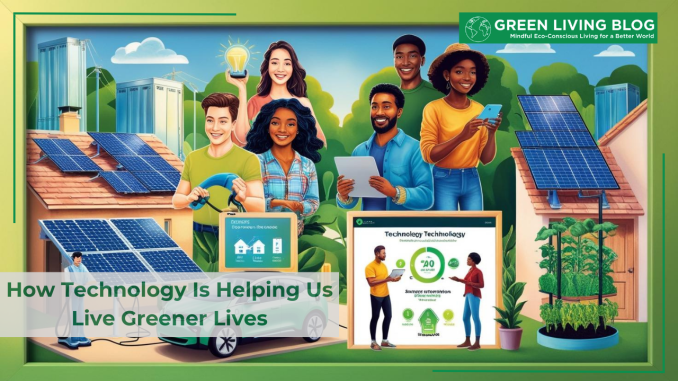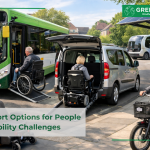
In today’s climate conscious world, the intersection of sustainability and technology is no longer a distant ideal, it’s a thriving reality.
From smart energy systems to AI powered waste management, technological advancements are enabling individuals and communities to reduce their environmental footprint in meaningful ways.
For anyone interested in living more sustainably, embracing the right tech tools can lead to impactful change without drastically altering daily routines.
Smart Homes for Sustainable Living

One of the most immediate ways technologies support green living is through smart home devices. Energy efficient thermostats like Nest or Hive optimize heating and cooling by learning your behavior and adjusting accordingly. This not only reduces your carbon emissions but also lowers utility bills. Similarly, smart lighting systems powered by motion sensors ensure lights are only on when necessary, cutting down unnecessary electricity use.
For those taking it a step further, solar panels combined with smart meters allow for real-time energy monitoring. Households can track their solar production, usage patterns, and adjust behaviors based on live data. It’s a powerful way to become more conscious of consumption habits and shift toward greener alternatives.
Eco-Friendly Transportation Goes Digital
Electric vehicles (EVs) have gone mainstream, but technology is pushing eco transport even further. Apps now guide users to nearby EV charging stations, while AI powered navigation systems suggest routes with minimal traffic to reduce emissions. Public transport is also becoming more efficient with real time tracking and scheduling, making it easier for people to leave their cars at home.
In urban settings, shared mobility options like e-bikes and scooters, accessed via mobile apps, offer flexible, zero emission alternatives. These technologies not only cut down on congestion and air pollution but also encourage a shift away from car ownership in favor of more sustainable travel.
Waste Reduction with Smart Tools
Household and industrial waste pose enormous challenges to the environment, but new tech solutions are offering smart ways to combat this issue. AI based recycling systems now sort waste with better accuracy than ever before. Apps that scan barcodes to determine recyclability, or platforms that track food expiration to minimize waste, are increasingly popular among eco-conscious consumers.
For creatives and professionals working with digital assets, even simple tools like a background eraser can help reduce the need for printed materials, making visual content more adaptable for digital formats. By minimizing paper use and relying on digital platforms, individuals and businesses alike can significantly reduce their ecological impact.
The Rise of Smart Agriculture
Sustainability doesn’t stop at the city limits; agriculture is also experiencing a green tech revolution. Smart irrigation systems use real time weather data and soil moisture sensors to prevent overwatering, conserving a vital natural resource. Drones equipped with AI can monitor crop health and pest activity, allowing for targeted treatments that reduce the need for harmful chemicals.
These innovations not only protect the environment but also help farmers increase yields and reduce costs. Sustainable agriculture powered by technology is proving that ecological responsibility and economic viability can go hand in hand.
Conscious Consumption Through Digital Platforms

Thanks to e-commerce and smartphone apps, making eco conscious purchases has never been easier. Platforms now offer filters for sustainable brands, carbon neutral shipping options, and detailed product life cycle information. Consumers are empowered to support businesses that align with their values, from fashion to food to home goods.
In addition, AI-powered recommendation engines can now suggest sustainable alternatives based on browsing history, making it easier for users to make environmentally friendly choices without additional research or effort.
Education and Awareness in the Digital Age
Finally, technology plays a vital role in spreading environmental awareness. Social media platforms and educational apps have become essential tools for disseminating information about climate change, zero waste living, and conservation. Gamified apps for children teach eco-habits in a fun, engaging way, ensuring the next generation is informed and motivated to live sustainably.
Virtual reality experiences are even being used to immerse users in the realities of deforestation, ocean pollution, and other global crises. This kind of engagement often leads to stronger emotional connections and more actionable responses to environmental issues.
Final Thoughts
Green living is no longer limited to niche communities or rural retreats. With the help of modern technology, anyone can take meaningful steps toward a more sustainable lifestyle whether by automating energy usage, adopting smart transportation, minimizing waste, or making informed purchases. As innovation continues to grow, so too does our potential to live in harmony with the planet. Embracing these tools is not just a convenience; it’s a responsibility and an opportunity to shape a better future for all.
![]()
Author Profile
- Passionate content creator, contributor, freelance writer and content marketing allrounder.
Latest entries
 BusinessFebruary 20, 2026How Sustainable Businesses Navigate Complex Payment Processing Challenges
BusinessFebruary 20, 2026How Sustainable Businesses Navigate Complex Payment Processing Challenges DictionaryFebruary 13, 2026What is Climate Change Evidence?
DictionaryFebruary 13, 2026What is Climate Change Evidence?  DictionaryFebruary 4, 2026What Does Net Zero Mean?
DictionaryFebruary 4, 2026What Does Net Zero Mean? Green LivingJanuary 15, 2026Green Transport Options for People with Mobility Challenges
Green LivingJanuary 15, 2026Green Transport Options for People with Mobility Challenges






Leave a Reply
You must be logged in to post a comment.